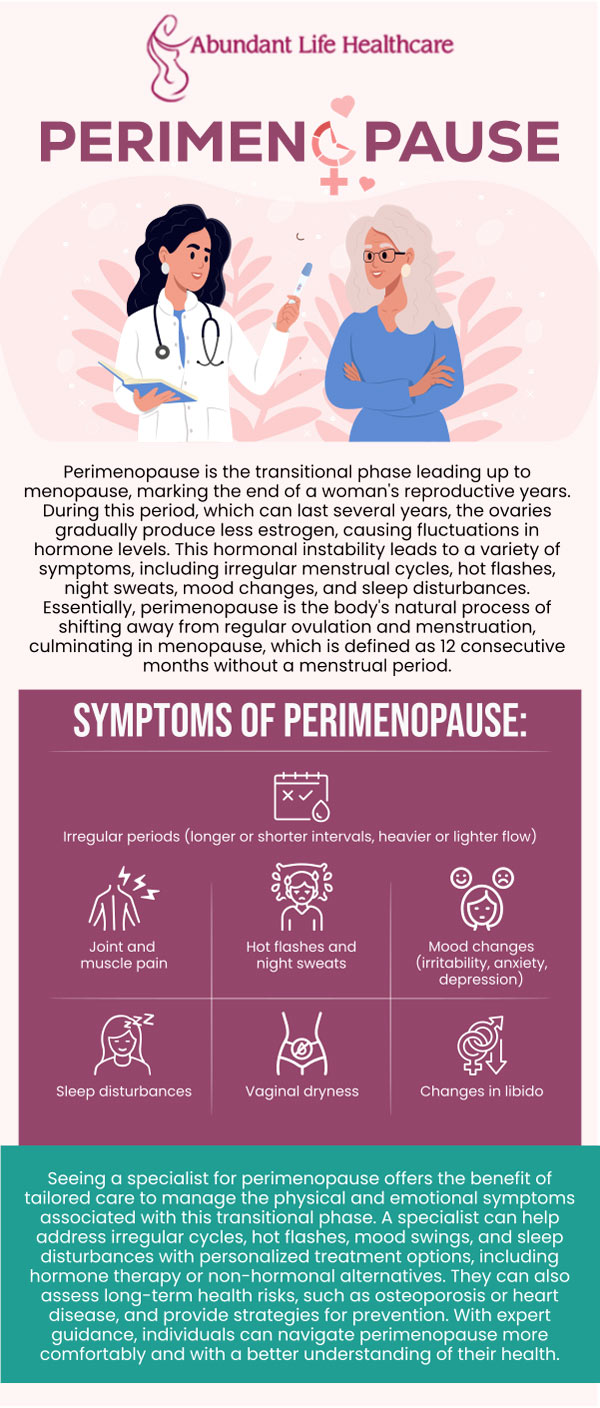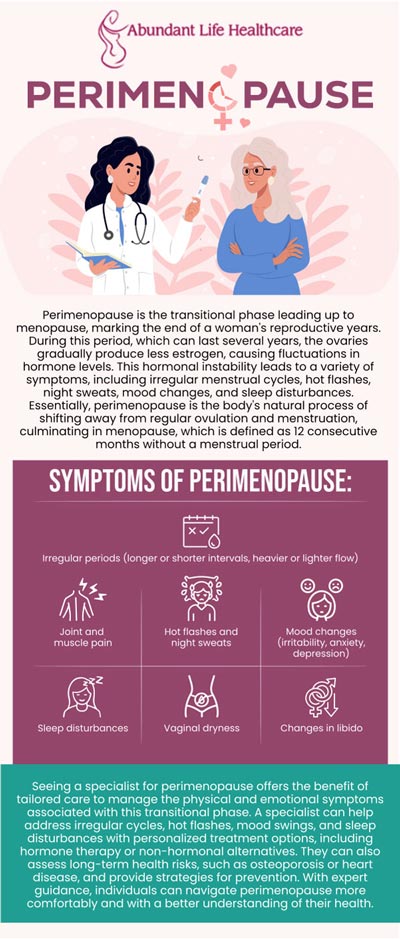What Is Perimenopause? – When And How Do You Get It?
Perimenopause is the transitional phase leading up to menopause, marked by hormonal changes that can cause various symptoms such as irregular periods, hot flashes, and mood swings. It typically begins in a woman’s 40s but can start earlier. Visit Dr. Jean-Gilles, DO, FACOG to understand when it occurs and how to manage symptoms and improve overall well-being during this stage of life. For more information, contact us today or book an appointment online. We are conveniently located at 601A Professional Drive, Suite 370, Lawrenceville, GA 30046.


Table of Contents:
What early signs can indicate the beginning of perimenopause?
How do hormone changes trigger perimenopause?
Can perimenopause begin earlier than expected?
How do doctors confirm the onset of perimenopause?
Dr. Jean-Gilles, MD: Your Trusted Partner for Perimenopause Care at Abundant Life Healthcare
The early signs of perimenopause may vary on an individual basis but often involve changes to the menstrual cycle, such as irregular timing, lighter or heavier flow, or skipped periods. These shifts happen because hormone levels begin to fluctuate in a less predictable way, making cycles less consistent than they once were. Alongside these changes, individuals may notice symptoms like hot flashes, disrupted sleep, or sudden shifts in mood that were not as common before. Physical changes often appear gradually, with symptoms coming and going rather than appearing all at once. Some women report increased sensitivity to stress, difficulty concentrating, or changes in energy levels. Others may find that symptoms vary month to month, with stretches of normalcy followed by periods where discomfort is more pronounced. This inconsistency can make the early stage of perimenopause feel uncertain.
Specialists at Abundant Life Healthcare may direct patients to keep track of patterns in their cycles and symptoms. Monitoring these changes over time helps identify whether the body is beginning the transition into perimenopause or whether another health condition may be contributing to what is being experienced.
Perimenopause begins when the ovaries start producing lower levels of estrogen and progesterone, two hormones that regulate the menstrual cycle and influence many other body systems. Instead of a steady decline, hormone levels rise and fall unpredictably, creating shifts that can feel disruptive. This uneven pattern is what leads to irregular cycles, temperature changes, and the emotional symptoms often tied to this stage. Estrogen fluctuations, in particular, can affect the brain’s regulation of mood and sleep. This explains why some individuals notice difficulty with rest, heightened irritability, or more intense premenstrual symptoms during this transition. Progesterone changes also impact the uterine lining, which is why cycles may become heavier or lighter from one month to the next.
While most women enter perimenopause in their forties, it can sometimes begin earlier due to genetic factors, medical history, or certain health conditions. For example, women whose mothers experienced early menopause may find their own transition starts sooner than average. Lifestyle factors such as smoking or chronic stress may also contribute to an earlier onset. Medical treatments that affect the ovaries, such as chemotherapy, radiation, or surgical removal, can bring about perimenopausal changes ahead of schedule. In some cases, autoimmune conditions that influence hormone production can also play a role. Because of this, there is no single age that defines the beginning of perimenopause for every woman.
Providers consider these individual factors when evaluating early onset symptoms. Through careful review of medical history and current health, they can help determine whether symptoms are part of perimenopause or connected to another condition that needs attention.
Doctors often begin by evaluating a patient’s symptoms and changes in menstrual cycles. Since irregular periods are a hallmark of this stage, detailed accounts of cycle length, flow, and consistency provide valuable information. In addition to cycle changes, providers look at other common symptoms such as hot flashes, mood fluctuations, or trouble sleeping to gain a clearer picture. Blood tests may be used to measure hormone levels, although fluctuating results sometimes make this method less definitive. Tests may also be ordered to rule out thyroid issues or other conditions that can mimic perimenopausal symptoms. In combination with the patient’s age and history, these assessments help confirm whether perimenopause has started.
At Abundant Life Healthcare, specialists will take a comprehensive approach to the management of perimenopause. They focus on the overall experience of the patient, blending reported symptoms with medical evaluation. This holistic process ensures that individuals receive accurate guidance and support as they navigate the early stages of the menopausal transition.
Understanding what perimenopause is can be the first step toward managing this transition, and at Abundant Life Healthcare, you have a compassionate expert to guide you. Dr. Jean-Gilles, DO, FACOG, a board-certified OB/GYN, specializes in providing comprehensive care for women at all stages of life, including menopause management. His approach is built on careful listening and personalized treatment. Dr. Jean-Gilles’s expertise helps him accurately identify the various symptoms of perimenopause—from irregular periods to hot flashes and mood swings—and create a tailored plan to address them. You can trust that the team at Abundant Life Healthcare will provide the information and support you need to navigate this change with confidence and comfort.
Visit Abundant Life Healthcare to learn more about perimenopause and how we can help you navigate this natural transition with personalized care and support. For more information, contact us today or book an appointment online. We are conveniently located at 601A Professional Drive, Suite 370, Lawrenceville, GA 30046. We serve patients from Lawrenceville GA, Suwanee GA, Snellville GA, Duluth GA, Dacula GA, Lilburn GA, Loganville GA, Auburn GA, and surrounding areas.
Check Out Our 5 Star Reviews


Additional Services You May Like

Additional Services You May Like
- Obstetrics
- Pregnancy
- Gynecologist
- Birth Control
- Labiaplasty
- Microblading
- Weight Loss
- Semaglutide GLP-1
- Pap Smears
- Pelvic Pain
- Laser Hair Removal
- In House Ultrasound (Including 3D)
- Vaginal Birth After C-Section (VBAC)
- Pregnancy As High Risk
- Multiple Gestations
- Postpartum Counseling
- 24hour/365days On Call Service
- Annual Exam
- Abnormal Uterine Bleeding
- Management Of Endometriosis
- Ultrasound
- Pelvic Organ Prolapse
- Urinary Incontinence
- Perimenopause And Menopause
- Sexual Dysfunction
- Fat Freeze (Like Cool Sculpting)
- Body Contouring
- Ozempic
- Civil Surgeon
- Hormone Replacement Therapy
- Immigration Medicine
- Biote Hormone Pellets
- GLP-1
- Peptide Therapy




